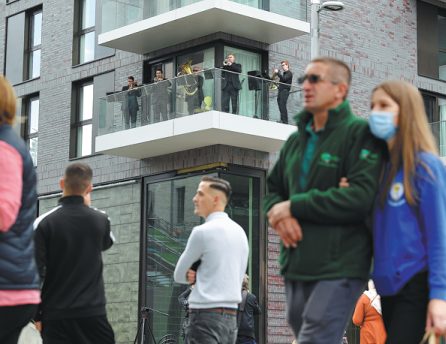UK braces for post-pandemic spike in need for mental health services


People are increasingly struggling with the mental strain of having lived through a pandemic, something the United Kingdom's National Health Service fears will only get worse.
Doctors believe people who focused on surviving the day-today physical and economic challenges posed by the novel coronavirus outbreak in recent months are likely to become more susceptible to a sort of post-traumatic shock when the pandemic winds down.
They also fear that a backlog of problems will surface among people with preexisting mental health problems who deferred treatment or who could not get access to it at the height of the pandemic's disruption.
After a 30 percent short-term fall in referrals by general practitioners for mental health services, the latest projections call for a rise in demand in the long term by as much as 20 percent. That would eventually take the number of people being treated for mental health problems well past pre-pandemic levels.
The NHS Confederation, a membership body for organizations that commission and provide NHS services, has urged people needing help to come forward now, in order to avoid contributing to an anticipated surge in demand for services in the coming months.
The organization added that mental health services need "intensive support and investment" if they are to cope with what is expected to come.
Sean Duggan, head of the confederation's Mental Health Network, told the BBC that when novel coronavirus cases were at their peak, people stayed away from mental health services, just as they did from other parts of the NHS, because they wanted to avoid catching the virus.
"The concern is, if you leave problems they can get worse," he said.
As a result, providers of mental health services are planning to deal with an increasing number of people with preexisting conditions that have worsened during the pandemic lockdown, as well as a sharp rise in the number of new patients.
The new patients are expected to include people who have had negative reactions to isolation, uncertainty about the future, fallout from increased drug and alcohol use, and problems resulting from a documented increase in domestic violence.
The challenge will be compounded by the fact that mental health service providers will need to operate safely just like all other parts of society, with social distancing measures in place and effective infection control, which is expected to reduce capacity by between 10 and 30 percent.
NHS England has acknowledged the burgeoning problem and said "mental health needs may increase significantly".
It is aiming to make it easier for people to use a service called Improving Access to Psychological Therapies, which is the main gateway for people with mild to moderate conditions, and to which people can refer themselves.
NHS England has also called for more therapy and support for people with severe mental illness.
It is also gearing up for a rise in the number of NHS workers in need of mental health support as they return from the front line.
GP Online magazine said recently that a British Medical Association survey found that more than half of general practitioners in the UK were experiencing work-related mental health problems due to the pandemic.
Mental health support will also be boosted by charities such as Campaign Against Living Miserably, which aims to help young people who are struggling to live amid the pandemic.
The Guardian newspaper said its own research found that twice as many adult Britons now suffer from depression, compared with before the pandemic.
An Office for National Statistics survey of 3,500 people found that around one in five had experienced symptoms of depression during June, including poor sleep quality, anxiety, mood swings and an inability to make decisions.
The New Statesman magazine said people with inadequate savings, the unemployed, and those with disabilities are more likely to have experienced depression during the lockdown.
Sophie Corlett, director of external relations at the mental health charity Mind, told the magazine, "It's worrying to see an increase in the number of people experiencing depression.
"As more and more people ask for support for their mental health, well-resourced timely treatment must be available for anyone who needs it."
An article this month in the medical journal The Lancet said the world had failed to meet mental health needs before the pandemic, so the struggle will be even more challenging as the outbreak winds down.
In addition, the Lancet article quoted Antonio Guterres, director-general of the United Nations, as saying in May: "The mental health and wellbeing of whole societies have been severely impacted by this crisis and are a priority to be addressed urgently."

































